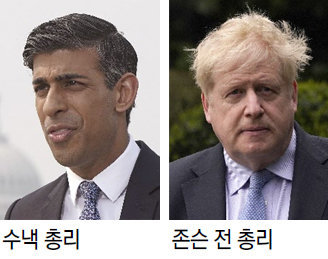British PM hits out at Johnson’s honors list
British PM hits out at Johnson’s honors list
Posted June. 14, 2023 07:55,
Updated June. 14, 2023 07:55

British Prime Minister Rishi Sunak and former Prime Minister Boris Johnson engaged in a heated public debate. Sunak, who served as chancellor of the Exchequer during Johnson's tenure, found himself in a difficult position when Johnson faced controversy over the "Partygate" scandal, where he was accused of violating COVID-19 lockdown rules to attend parties. Sunak was the first among key ministers to resign in July last year, leading to other ministers tendering their resignations and culminating in Johnson's resignation.
During a conference in London on Monday, Prime Minister Sunak argued that Johnson's hasty bestowal of honors to close allies was "inappropriate." Mr. Sunak expressed his determination not to succumb to undue pressure, saying, "I promised to change politics when I took office."
Typically, former prime ministers have requested honors for some of their close aides as a means of rewarding them after retirement. These nominations undergo scrutiny by the House of Lords Appointments Commission before being ultimately confirmed. Former Prime Ministers David Cameron and Theresa May recommended around 60 individuals each, but it has been reported that Johnson submitted a list of approximately 100 names.
In the final list announced on June 9, eight individuals, including Johnson's close allies Nadine Dorries, former Culture Secretary; Neil Adams, Member of Parliament; and Alok Sharma, former president of the 26th UN Climate Change Conference of the Parties (COP26), were excluded. Following Johnson's camp expressing their displeasure, Prime Minister Sunak has made a riposte in public.
In response to Sunak's statement, Johnson claimed in a statement that "Sunak is talking nonsense." While admitting to requesting a review, Johnson argued that Sunak's reaction was excessive. It is expected that the two will continue to clash over the U.K. government's final report on the "Partygate" scandal, to be published on Wednesday, as well as Johnson's candidacy in next year's general election.
asap@donga.com







